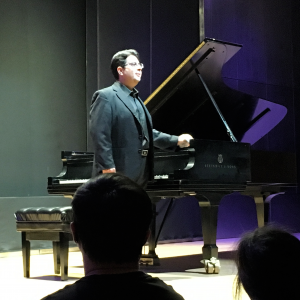Pianist Gábor Farkas performed at the Bruno Walter Auditorium in New York on July 29th, 2019. This event was part of the Classical Bridge Festival organized by New York Concert Artists & Associates.
Farkas’ program of Chopin and Liszt was enticing. It consisted of 4 Impromptus, a Mazurka (C sharp minor Op. 50 No. 3) and a Ballade (No. 1, G minor) by Chopin, followed by selections from Liszt’s Années de Pelèrinages.
Farkas has a long list of credentials and came on stage projecting relaxed confidence. His technical prowess was soon evident. His fast runs were so smooth that one could (hypothetically) balance a glass of wine on the back of his hands. He looked VERY good.
Chopin
I love Chopin and if you play Chopin well, I love you too! I wanted to be enchanted by Gábor Farkas, but somehow I wasn’t. Nowhere was this more evident than in Chopin’s painful yet ultimately triumphant Ballade No. 1 in G minor.
Farkas lost me in the opening bars due to a moment of unconvincing rubato, but regained his momentum and turned in a respectable performance with plenty of fireworks. When he finished, there was rowdy cheering.
While Farkas was agile and expressive, something felt “off” about this Ballade. I consulted the gentleman in the next seat. We agreed that it was a problem of authenticity. Farkas’ played with great competence, but the music did not seem to inhabit him.
Liszt
In contrast, Gábor Farkas was in his element with Liszt, excelling in low-end hammering power, octaves and huge climaxes. There are few more entertaining composers than Liszt for such drama.
Later, Farkas joked that the piano would no longer be in tune. Of course Liszt would have broken it… but I digress! Liszt is not at the top of my list (sic), but it was good… listening.
Conclusion
Gábor Farkas’ signature move at the piano is tilting his head back and staring into space as he plays. This communicates little. And that was my quibble with this otherwise impressively competent pianist when playing Chopin. His feelings were opaque.
The pianist is the conductor of the audience. We like him/her to lead us, particularly with a Romantic composer like Chopin. That’s not to say that we want the pianist to over-act at the keyboard. We can leave that to the adorable Lang Lang! But give us some cues, show us that you feel something.
There are subtle and not-so-subtle ways to project emotions to an audience. But you can’t just stare into space and expect us to know what you feel.

You must be logged in to post a comment.